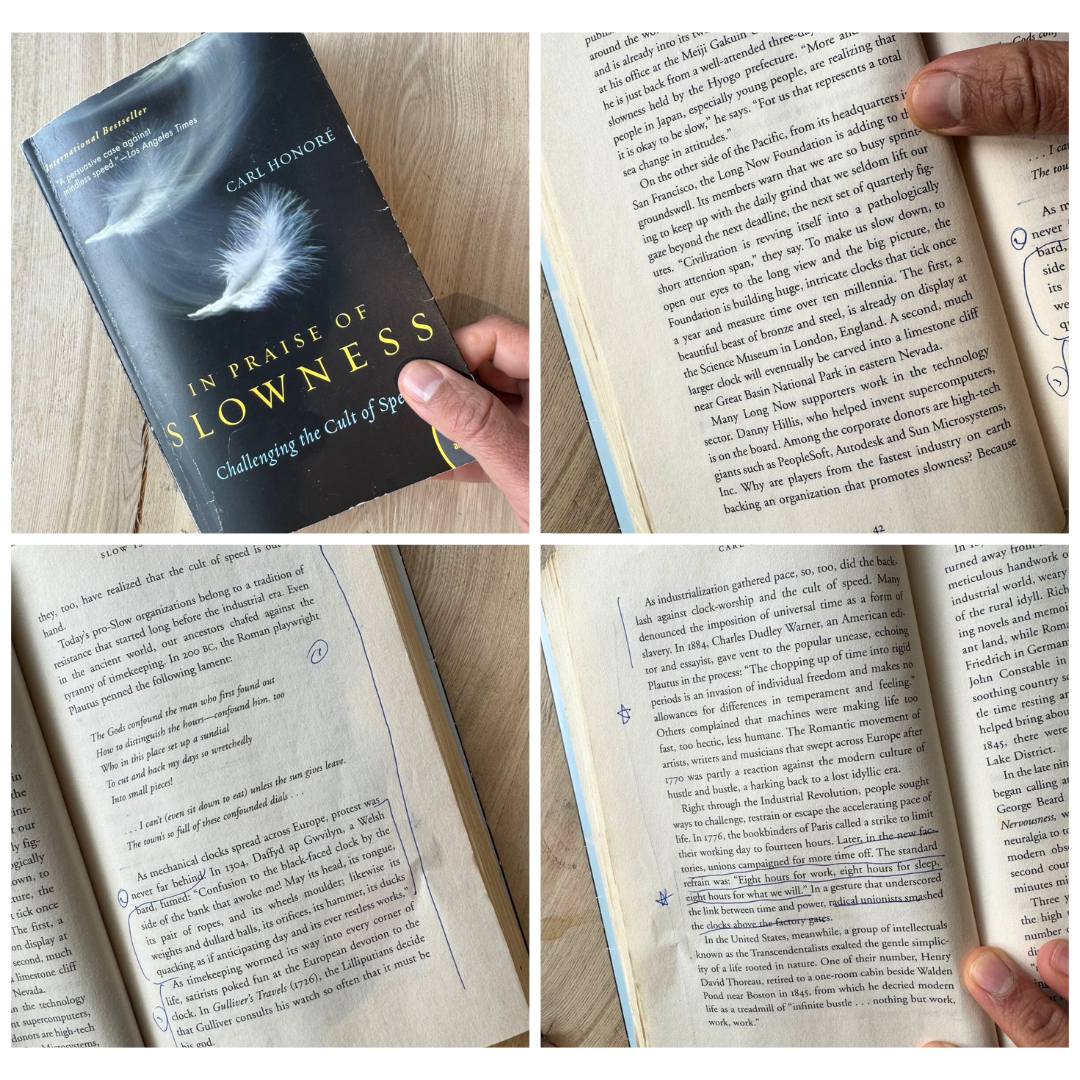Hey everyone,
Do you feel like your brain is experiencing a grand quickening? Is the suddenly new ability of everybody being able to type anything into chatGPT and get a perfect picture of it 5 seconds later taking over your group chats too?
I feel you. We got this. As always we can choose our speed. We just have to be more mindful and intentional about it. Walks. Phone calls. Dates. Reading. Birding. Cooking. Buying a magazine. Buying a book.
It was in this spirit that I re-stumbled across a fascinating little history of the human resistance to this grand quickening from 200 BC to today. Maybe this feeling is just Lindy? Or are we experiencing something new?
Take a read and let me know,
Neil
Excerpt from 'In Praise of Slowness'
Written by Carl Honoré
"On the other side of the Pacific, from its headquarters in San Francisco, the Long Now Foundation is adding to the groundswell. Its members warn that we are so busy sprinting to keep up with the daily grind that we seldom lift our gaze beyond the next deadline, the next set of quarterly figures. 'Civilization is revving itself into a pathologically short attention span,' they say. To make us slow down, to open our eyes to the long view and the big picture, the Foundation is building huge, intricate clocks that tick once a year and measure time over ten millennia [sponsored by Jeff Bezos and carved into a mountain he owns]. The first, a beautiful beast of bronze and steel, is already on display at the Science Museum in London, England. A second, much larger clock will eventually be carved into a limestone cliff near Great Basin National Park in eastern Nevada.
Many Long Now supporters work in the technology sector. Danny Hillis, who helped invent supercomputers, is on the board. Among the corporate donors are high-tech giants such as PeopleSoft, Autodesk and Sun Microsystems, Inc. Why are players from the fastest industry on earth backing an organization that promotes slowness? Because they, too, have realized that the cult of speed is out of hand.
Today's pro-Slow organizations belong to a tradition of resistance that started long before the industrial era. Even in the ancient world, our ancestors chafed against the tyranny of timekeeping. In 200 BC, the Roman playwright Plautus penned the following lament:
The Gods confound the man who first found out How to distinguish the hours—confound him, too Who in this place set up a sundial To cut and hack my days so wretchedly Into small pieces!
As mechanical clocks spread across Europe, protest was never far behind. In 1304, Daffyd ap Gwvilyn, a Welsh bard, fumed: 'Confusion to the black-faced clock by the side of the bank that awoke me! May its head, its tongue, its pair of ropes, its wheels moulder: likewise its weights and dullard balls, its orifices, its hammer, its ducks quacking as if anticipating day and its ever restless works.'
As timekeeping wormed its way into every corner of life, satirists poked fun at the European devotion to the clock. In Gulliver's Travels (1762), the Lilliputians decide that Gulliver consults his watch so often that it must be his god.
As industrialization gathered pace, so, too, did the backlash against clock-worship and the cult of speed. Many denounced the imposition of universal time as a form of slavery. In 1884, Charles Dudley Warner, an American editor and essayist, gave vent to the popular unease, echoing Plautus in the process: 'The chopping up of time intro rigid periods is an invasion of individual freedom and makes no allowances for differences in temperament and feeling.' Others complained that machines were making life too fast, too hectic, less humane. The Romantic movement of artists, writers and musicians that swept across Europe after 1770 was partly a reaction against the modern culture of hustle and bustle, a harking back to a lost idyllic era.
Right through the Industrial Revolution, people sought ways to challenge, restrain or escape the accelerating pace of life. In 1776, the bookbinders of Paris called a strike to limit their working day to fourteen hours. Later, in the new factories, unions campaigned for more time off. The standard refrain was: 'Eight hours for work, eight hours for sleep, eight hours for what we will.' In a gesture that underscored the link between time and power, radical unionists smashed the clocks above the factory gates."
These are just 2 out of 282 pages in the phenomenal 'In Praise of Slowness' by Carl Honoré.







